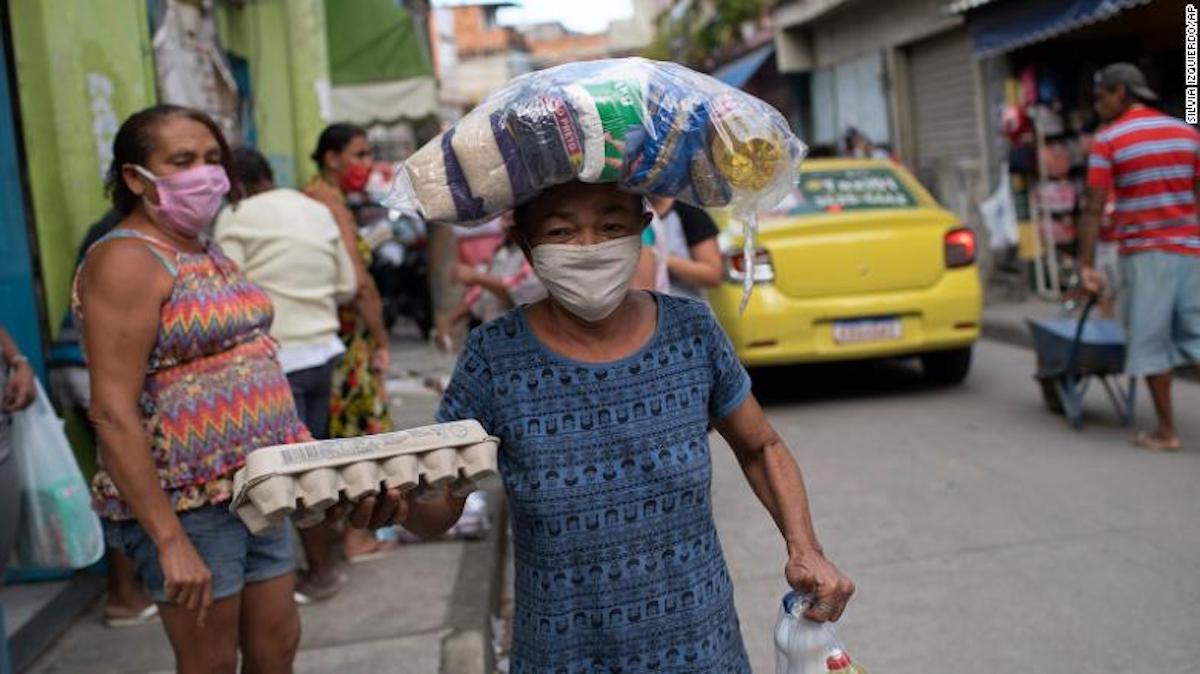Oxfam: 12,000 would starve every day from the pandemic 0:41
(CNN) - The coronavirus pandemic has already claimed more than half a million lives worldwide, and the number of cases continues to rise. An Oxfam report warns that the hunger crisis exacerbated by the pandemic could kill more people each day than the infection itself.
An estimated 12,000 people a day could starve to death from covid-19 by the end of the year, Oxfam said. In comparison, data from Johns Hopkins University show that the pandemic's deadliest day so far was April 17, when 8,890 deaths were recorded.
"The pandemic is the drop that spills the glass for millions of people who are already struggling with the impacts of conflict, climate change, inequality and a broken food system that has impoverished millions of food producers and workers," he assured in a Oxfam's interim executive director, Chema Vera, announced.
- 22 men have more wealth than the 326 million women in Africa, according to Oxfam
Problems that have left many unable to put food on the table include loss of income caused by unemployment or reduced remittance payments, lack of social support for those working in the informal economy, and interruptions in supply chain and the obstacles faced by producers.
Travel restrictions related to closings, which affect not only workers and farmers, but also the delivery of humanitarian aid, also contribute to the crisis.
These new challenges add to long-standing problems that worsen global hunger, including wars, climate change, and growing inequality.
Oxfam appealed to titans of the food and food industry such as Coca-Cola, Unilever, General Mills, among others.
Meanwhile, those at the top continue to make a profit: Eight of the largest food and beverage companies have paid more than $ 18 billion to shareholders since January, even as the pandemic spread worldwide, tenfold more than what, according to the UN, was needed to prevent people from starving, "the statement read.
FAO warns of increased hunger in Latin America 4:25Covid-19 exacerbates food shortages
According to Oxfam, the coronavirus pandemic "has added fuel to the fire of a hunger crisis that is already growing."
Data from the World Food Program cited by Oxfam estimate that in 2019, 821 million people were food insecure and 149 million suffered "crisis hunger or worse." Current projections say the number of people experiencing crisis-level hunger could reach 270 million in 2020 as a result of the coronavirus pandemic, an increase of more than 80% from the previous year.
Oxfam's briefing highlights 10 critical places of extreme hunger worldwide where the pandemic is worsening already critical situations. They are: Yemen, Democratic Republic of the Congo, Afghanistan, Venezuela, the Sahel of West Africa, Ethiopia, Sudan, South Sudan, Syria and Haiti.
But the negative effects of the pandemic on food security are also felt in middle-income countries such as Brazil, India and South Africa, where "the pandemic has put the people who were about to fall due to the pandemic to the limit," according to Oxfam. .
Brazil and India are now grappling with the world's second and third largest coronavirus outbreak, second only to the United States. Cases in Brazil have exceeded 1.7 million, and India has more than 767,000. The United States broke the threshold of 3 million cases last Wednesday.
Food insecurity in the United States and the pandemic
Hunger is increasing globally, and the United States is no exception.
Over the past week, 1.3 million people submitted initial applications to receive unemployment benefits, and according to Feeding America, another 17 million people in the United States could be food insecure in 2020 as a result of the pandemic. That would bring the total number of Americans struggling to put food on the table to about 54 million people, or one in six, the organization estimates.
"This is a 46% increase from the 37 million people who were food insecure before the covid-19 crisis," according to 2018 data, said Emily Engelhard, managing director of Feeding America.
Many more Americans are taking advantage of food banks across the country to survive, according to the organization.
According to preliminary data from the latest Feeding America food bank survey, 83% of the organization's food banks reported seeing an increase in the number of people served compared to this time last year, with an increase 50% average, Engelhard explained.
The pandemic also exposed vulnerabilities in the United States' food supply chains. For example, covid-19 outbreaks severely affected meat processing plants across the country, causing shortages.
"We need a more diversified supply chain system that has many more actors" to avoid these kinds of problems, Miguel Gómez, associate professor at Cornell's School of Applied Economics, told CNN.
"There has to be a balance between having regional players and more global players. You should not depend on a single supply chain to feed the population, because that is risky, "said Gómez, an expert in supply chain sustainability.
Employees of meat plants infected with covid-19 2:50Avoid worst case
Gomez said he was not surprised by Oxfam's bleak predictions, although he is optimistic that the worst-case scenario they anticipate can be avoided.
"It is clear that our food distribution system has great inequalities," said Gómez. "A long-term concern is how we can shift the emphasis from just focusing on efficiencies and maximizing profits to a more resilient and fair food production and distribution system," he added.
Gomez believes that the solutions lie in global policy actions, such as investing in food assistance programs, building or strengthening food safety nets, and supporting farmers as they reduce their incomes.
Stronger government intervention to buy and redistribute food, and measures to prevent retail prices for basic necessities from increasing "at least in the short term" would also be shocking, Gomez argued.
"We must not forget the importance of public or government policies to guarantee the availability of products at fair prices," said Gómez.
Oxfam's recommendations on how to resolve the crisis in question also highlight the importance of global governance and leadership.
“Governments can save lives now by fully funding the call to the UN covid-19 Fund, making sure that aid reaches those who need it most, and canceling the debts of developing countries to free up funds for social protection and care medical ”, said the acting executive director of Oxfam Chema Vera.
"To end this hunger crisis, governments must also build fairer, more robust and more sustainable food systems that put the interests of food producers and workers before the profits of big food and agribusiness," he added. Vera.
HungerOxfamPoverty




/cloudfront-eu-central-1.images.arcpublishing.com/prisa/Z4OXSO2IHO67YFUITBGRL2PYYI.jpg)


/cloudfront-eu-central-1.images.arcpublishing.com/prisa/AJG7IZEA3JGX3NF54WRHHWVVPU.jpg)
